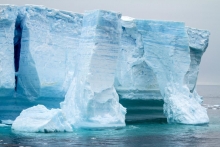- You are here:
- GT Home
- Sciences
- Home
- List of Available Research Projects
This project has to do with how to make projections of future sea level rise that are the most useful for people making on-the-ground decisions, even under the considerable uncertainty that still exists surrounding future ice sheet melt. In particular, we are interested in determining the minimum level of uncertainty attainable in projections of future global sea level that comes from unpredictable fluctuations in the climate system, leading to probabilistic projections of ice sheet melt (see accompanying figure).
When icebergs fracture from ice sheets they often become trapped in a dense icy aggregation called mélange that fringes the coastlines of Greenland and parts of Antarctica. This melange controls the annual cycle of ice sheet mass loss through iceberg fracture at many glaciers and also the rate at which icebergs enter into the open ocean. Once in the open ocean, icebergs can influence ocean circulation through the input of fresh meltwater and may also cause hazardous conditions in Arctic shipping lanes.
Ice sheets have gone through periods of rapid melting, causing sea level to rise many times faster than the current rate of rise. Some of these rapid melting events have occurred during periods when ocean and atmospheric temperatures were at or just above modern temperatures. It is thought that there are instabilities intrinsic in the dynamics of ice sheet flow and melting that may cause such rapid sea level rise events, even without changing climate.




